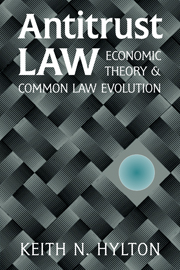Book contents
- Frontmatter
- Contents
- Preface
- 1 Economics
- 2 Law and Policy
- 3 Enforcement
- 4 Cartels
- 5 Development of Section 1 Doctrine
- 6 Rule of Reason and Per-Se Rule
- 7 Agreement
- 8 Facilitating Mechanisms
- 9 Boycotts
- 10 Monopolization
- 11 Power
- 12 Attempts
- 13 Vertical Restraints
- 14 Tying and Exclusive Dealing
- 15 Horizontal Mergers
- 16 Mergers, Vertical and Conglomerate
- 17 Antitrust and the State
- Index
8 - Facilitating Mechanisms
Published online by Cambridge University Press: 12 November 2009
- Frontmatter
- Contents
- Preface
- 1 Economics
- 2 Law and Policy
- 3 Enforcement
- 4 Cartels
- 5 Development of Section 1 Doctrine
- 6 Rule of Reason and Per-Se Rule
- 7 Agreement
- 8 Facilitating Mechanisms
- 9 Boycotts
- 10 Monopolization
- 11 Power
- 12 Attempts
- 13 Vertical Restraints
- 14 Tying and Exclusive Dealing
- 15 Horizontal Mergers
- 16 Mergers, Vertical and Conglomerate
- 17 Antitrust and the State
- Index
Summary
Facilitating mechanisms make collusion more effective by serving one or more of the following functions: establishing a method of monitoring compliance, enabling parties to enforce compliance, and hiding collusion from public view. The important cases have dealt with data dissemination plans.
The central doctrinal issue is whether per se or rule of reason analysis applies to facilitating mechanisms, such as data dissemination plans. Start with the basic proposition from Socony that price fixing is per se illegal. It follows that a data dissemination plan violates Section 1 if it is a necessary and sufficient element of a price-fixing plan. In general, however, the link between the dissemination plan and the price-fixing charge presents a difficult question. A data dissemination plan may facilitate collusion, or it may facilitate other less harmful or even beneficial ends. In addition, there will not be clear evidence in these cases of an agreement on prices, for otherwise the existence of a data dissemination plan would be irrelevant. The plaintiff therefore must prove, more or less, that the dissemination plan was a sufficient element of a price-fixing conspiracy, so that it would be appropriate for a court to infer conspiracy from the existence and operation of the plan.
Per se and rule of reason tests require different standards of proof when applied to facilitating mechanisms. A per-se rule dispenses with the plaintiff's burden of establishing the inference of a conspiracy to restrain trade.
- Type
- Chapter
- Information
- Antitrust LawEconomic Theory and Common Law Evolution, pp. 144 - 165Publisher: Cambridge University PressPrint publication year: 2003



